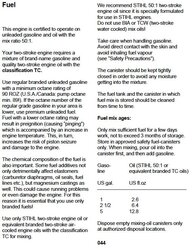Big_Redd, I think you are the one here with the refinery background, right? I appreciate any information and am willing to learn. I say that without sarcasm.
My understanding is from my chemistry degree and materials science & engineering work. Although this doesn't make me an expert in this particular field and I have not specialized in petrol-chemicals and formulations, I should be able to understand
any reference link you provide. Of course, this is an internet forum and you could say I'm fabricating my background. In fact, any of us could have that skepticism about one another, so that's why I provided a link to a reference and not my own writing/papers.
Please provide a link so I (we all) can learn.
Reference link:
http://www.ultralighthomepage.com/OIL/oil.html
Excerpt:
Water cooled two-cycle engine oils require higher levels of a heavy oil to prevent piston and cylinder wall scuffing. Because of their high average piston temperature, lighter oils evaporate too quickly from the piston cylinder contact area. The heavy base oil, which vaporizes at very high temperatures, resists evaporation and remains in place to provide lubrication to the piston and cylinder. Air cooled oil formulations must have much lower levels of the heavy base oil than water cooled engine oils. These oils require only a small amount of heavy oil to provide protection against piston scuffing and seizure at peak temperatures. High levels of heavy base oils in an oil formulated for air cooled engines can cause engine deposits. These deposits form as a result of incomplete burning of the heavy oil. The deposits can cause piston ring sticking and can eventually plug or disrupt the flow of the exhaust system, resulting in power loss and possible engine damage. Detergent additives should not be used in water cooled two-cycle oil formulations. When burned with the fuel, detergents produce an ash deposit in the cylinders. This ash deposit can possibly foul spark plugs., form exhaust port deposits which cause loss of power, and possibly create cylinder hot spots that can cause destructive pre-ignition. On the other hand, the only way to protect air cooled two-cycle engines against piston ring sticking at their high peak temperatures is to include some detergent additives in the oil formulation. Detergents provide high temperature deposit control not available from other additives used in the oil. However, in the air cooled engine, any ash deposits that could form from the detergents are dislodged by engine vibration and exhausted from the engine.
I'll try to find a better reference to discuss....




